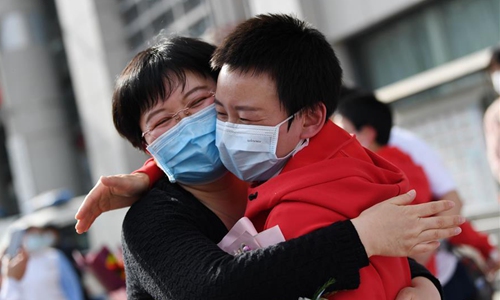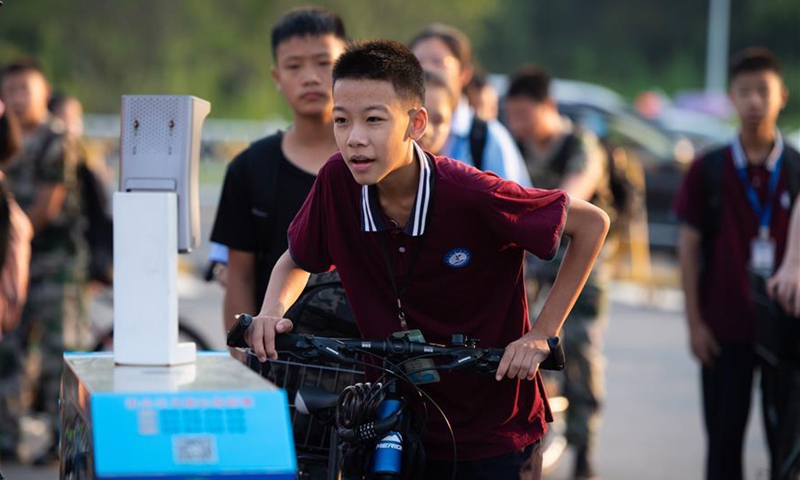1.4b people lead China's victory over COVID-19
Award ceremony injects confidence in Beijing’s arduous road to rejuvenation

Wei Fei (R), a member of the medical assistance team from the Second Affiliated Hospital of Xi'an Jiaotong University, hugs her colleague in Xi'an, capital of northwest China's Shaanxi Province, April 15, 2020. The 130 members of the medical assistance team supporting the virus-hit Hubei Province reunited with their families in Xi'an on Wednesday after quarantine. The medical team from the Second Affiliated Hospital of Xi'an Jiaotong University arrived in Wuhan on Feb. 8. Photo:Xinhua
Schools reopen; domestic travel reaches pre-pandemic level; the government sums up experience in the virus fight and rewards those who fought the virus… emerging signs suggest that COVID-19 is ending in China, spawning a question of who was behind the country's victory against coronavirus. The answer: its 1.4 billion people.
From Wuhan to Beijing, Dalian to Urumqi, China has managed to stop the viral spread in the fastest speed to ensure people's health; from city-wide lockdowns to precise prevention strategies, the central government has found ways to minimally disrupt people's lives while fighting the virus; from winter to summer, the Chinese people, be they government officials who orchestrated plans in response to the virus, to frontline doctors, ordinary people, have fought like great warriors and contributed their share to this arduous battle. They are, as the government hailed, the "formidable force" fighting coronavirus.
All outstanding representatives from those fields who fought bravely in the country's battle against the COVID-19 epidemic will be honored at a ceremony held on Tuesday morning in Beijing. During the event, Chinese President Xi Jinping is expected to confer the Medal of the Republic (China's highest state honor) and other honorary titles to those who made outstanding contributions to the fight.
Senior Chinese observers hailed the event as an overarching conclusion to China's hard-won battle, and said it also injected the greatest confidence in the country, which is on course to rejuvenation as it faces challenges from a complicated situation at home, and extreme attempts from some hegemonic powers to crack down on its development.

Students have their faces scanned before entering Daowu middle school in Liuyang City of Changsha, capital of central China's Hunan Province, Aug. 31, 2020. The primary and middle schools in Changsha have started their new semester on Monday. (Xinhua/Chen Sihan)
The nine-month fight involving 1.4 billion people was written in a 20,000-word article published by the Xinhua News Agency on Sunday. It detailed China's nine months-long battle against the virus.
"The government has always put people's lives first. The viral spread was preliminarily put under control in about one month. New daily increases of local cases dropped to single digits within two months after the outbreak. The virus battle in Wuhan city and Hubei Province, the hardest-hit places in the country, achieved a phased decisive victory within three months," the Xinhua article said.
A video trending on Monday features Qin Zhijiang, a 71-year-old man who contracted the virus. Qin said he "was reborn," thanks to medical workers' efforts. Qin's medical expenses, 1.5 million yuan ($219,538) will be covered by the government.
"We won't be treated without government support," Qin said.
Chinese unity
"The fight against COVID-19 shows the unity of the Chinese people when facing difficulties. Beneath the surface of those about to be awarded, many individuals and organizations have shown their dedication in laboratories and in hospital beds, and in fighting the virus day and night without being noticed by media and others," Zeng Guang, chief epidemiologist of the Chinese Center for Disease Control and Prevention (China CDC), told the Global Times.
Wuhan doctor Zheng Shuqun has been planning for a long time to take his octogenarian mother to Tibet this year. The plan was shelved at first because of the viral outbreak. He said it would probably have to be permanently canceled.
Zheng said when everyone in China was celebrating the lunar new year in late January, he and his colleagues were going around residential communities within his hospital's jurisdiction, and testing those who needed to be tested. "There were not enough protection supplies in late January and early February. The only protection we had was to turn away when patients coughed," Zheng said.
He said doctors at that time had to wear protective suits and diapers for at least eight hours a day. "After work, we were all wet inside the suits. We did not know whether it was sweat or urine--or both."
Zheng had been testing Wuhan people and treating the city's COVID-19 patients for nine months without a break. He joked that he would spend "half a year" to tell stories that touched him when the city fought the pandemic.
"Wuhan people are reluctant to call themselves heroes. In fact, we think those who came to help us are much more of heroes than us. We did what we should do to fight the unknown virus, and protect people we love. We are ordinary people in unusual times."
The busy, non-stop work of Zheng may continue for quite some time, as he said Wuhan is preparing for a possible resurgence of the virus as fall approaches. Asked about his travel plans with his mother, Zheng said: "I can take her anywhere, anytime as long as the virus recedes."
Recently, two pictures went viral on Chinese social media. One, taken in March, shows 87-year-old Wang Xin appreciating the sunset at Renmin Hospital of Wuhan University, escorted by Liu Kai, a Shanghai doctor who volunteered to help Wuhan at that time. On Friday, the two reunited at the hospital. Wang held Liu tight, with tears in his eyes. He said, "he is my lifesaver." Then the two relived the scene of watching the sunset.
Netizens called it "the most beautiful reunion ever."
Lasting memories
For Beijing community worker Li Li, reuniting with her "comrade in arms" against the pandemic wasn't so tearful. But it was touching.
Li said two weeks ago, she took a vacation to have dinner with fellow community workers and volunteers, who fought with her in the past nine months against the virus, "because we want to see each other's faces without masks. But it turns out we could not recognize each other anymore."
She joked that "at the early stage of the epidemic, and during the fresh outbreak emerging from Beijing's Xinfadi food market, everyone was pale, withered and burned out by the pressure. But they have since gained weight, and are aglow with happiness."
Li remembers vividly that after Beijing's Xinfadi outbreak, she and her colleagues came to knock on the doors of hundreds of residents in her community compounds, and distributed food to those under quarantine. "I rarely heard complaints from them. They were considerate about community workers as they would try to reduce the time for us to visit, like storing garbage a little longer for disposal later. It was an exhausting job, but it helped me see the neighborhood spirit that was long lost," Li said.
Qiu Haibo, an expert from the medical treatment group under the National Health Commission, finally arrived home in Nanjing on September 1, after spending 185 days fighting COVID-19 in Wuhan, Harbin, Jilin Province, and Urumqi in Xinjiang, which was the latest Chinese city to announce a return to normal last week. On Monday, Xinjiang cleared all confirmed COVID-19 cases and asymptomatic carriers and schools in the region reopened on the same day.
Qiu gained fame after netizens posted pictures of him in February, in which he looked much younger with black hair, and another one in March when his hair turned grey. Qiu joked that "it simply means I need a haircut."
Born and raised in Xinjiang, Qiu told the Global Times that everything in Urumqi makes him feel "homey," and that contributing to his hometown gives him a sense of accomplishment. "Thanks to the previous experiences in other cities, the virus battle in Xinjiang was fought in a more scientific, accurate and effective manner."
As the virus recedes in most places in China, Qiu decided it was time to return his Nanjing home where he now lives, and said "hopefully (the journey to Xinjiang) is the last stop for virus fight this year."